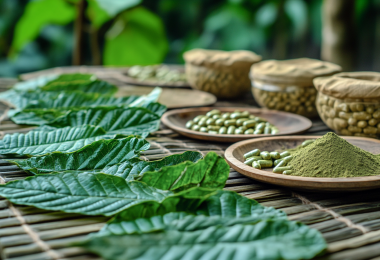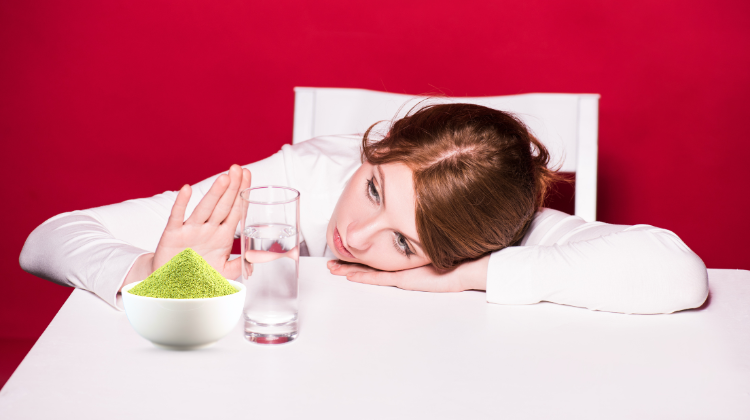
What is Kratom? The Complete Guide from Golden Monk
Introduction Kratom is a plant that inspires curiosity, debate, and misunderstanding. Some people hear about...
View PostYour cart is currently empty.
Continue ShoppingMenu
Cart
Your cart is currently empty.
Continue ShoppingSearch

A kratom hangover is a term people use to describe the groggy, sluggish, or foggy feeling that can show up the day after taking kratom, especially in higher amounts. As kratom’s popularity spreads worldwide for its natural benefits, more users have reported next-day side effects like headaches, nausea, and an overall heavy, tired mood. But what exactly causes this “kratom hangover,” and how common is it? Let’s look closer to understand why it happens and whether kratom causes a hangover.
So, does kratom give you a hangover? Does it happen to everyone? Or only in some cases? In this article, we’ll talk about this hangover and about signs people often experience. Some feel pain, have dry mouth, or can’t focus well.
If you’re curious about kratom, new to it, or wondering why some people mention this foggy feeling, keep reading. We’ll share what experts and users have noticed in a simple and clear way. This can help you stay aware and make careful choices.
A kratom hangover is a term people use for a set of next-day feelings that can show up several hours after having kratom. It doesn’t feel the same for everyone, but many mention:
Some also notice effects less common in an alcohol hangover, such as:
Not everyone feels this foggy, heavy sensation the next day. For those who do, it’s often linked more to how and when kratom is taken rather than kratom itself. Some factors people mention include:
These factors help explain why one person might feel perfectly fine, while another feels off the next morning. It also relates to how long does kratom hangover lasts, which can vary from person to person.
While both kratom and alcohol can leave you feeling rough the next day, the reasons behind these “hangovers” aren’t quite the same. To understand the differences, it is helpful to examine how each substance affects the body and the types of symptoms people typically experience. Here’s a quick side-by-side comparison of a kratom hangover vs. an alcohol hangover:
| Kratom Hangover | Alcohol Hangover |
| Next-day tiredness or drowsiness Headaches and dizziness Stomach discomfort and nausea Feeling foggy or slow | Next-day tiredness or drowsiness Headaches and dizziness Stomach discomfort and nausea Feeling foggy or slow |
| Some people report muscle tightness, diarrhea, or feeling uneasy, which is especially common with alcohol | Often comes with strong thirst and sensitivity to light and sound, and is less familiar with kratom |
| Often linked to timing, dehydration, or individual body response | Directly affects hydration and liver function |
No, a kratom hangover and an overdose are two very different things. A kratom hangover usually describes next-day tiredness, fog, mild stomach upset, or headaches that fade after some rest, fluids, and time. It’s often short-lived and linked to when or how kratom was taken.
An overdose, on the other hand, refers to a severe reaction that can include intense dizziness, vomiting, extreme drowsiness, and in severe cases, loss of consciousness. While both can involve feeling unwell, an overdose is a medical concern that may require immediate help.
The key difference is that a hangover is generally mild and temporary, while an overdose is far more serious and can be dangerous.
While a kratom hangover doesn’t affect everyone, many people share practical steps that seem to help lower the chances of feeling foggy or sluggish the next day:
Many people find that the kind of kratom they choose and the time of day they take it can make next-day grogginess more likely.
Because everyone reacts differently, noticing which strain or timing leaves you feeling off can help you avoid a kratom hangover.
A kratom hangover isn’t something everyone experiences, but for those who do, it can feel like waking up with a tired, heavy fog that lingers into the day. While it can seem similar to an alcohol hangover, there are key differences, and the next-day effect often comes down to factors like hydration, timing, sleep, and individual body response.
By being mindful about when and how you have kratom, choosing trusted products, and paying attention to your body’s signals, it may be possible to lower the chances of these unwanted effects.
Some people report feeling a kratom hangover the next day, a mix of tiredness, brain fog, stomach upset, or headaches. It doesn’t happen to everyone, and it often depends on factors such as timing, hydration, and individual body responses.
Most people say a kratom hangover can start about 6–8 hours later and may last into the next day, often fading within several hours to around half a day. The length can change based on the person, the type of kratom, and other factors like sleep or hydration.
This means a headache some people feel after having kratom, which is usually noticed the following morning. It can come along with tiredness, dizziness, or mild nausea as part of the overall kratom hangover.
Yes, different varieties may feel heavier or more calming, which can sometimes lead to more next-day fog. Others might feel lighter but can still bring tiredness if taken late or if the body is sensitive.
Some people talk about trying kratom for hangover relief after drinking alcohol, but it’s important to know this isn’t backed by clear scientific research. Combining kratom and alcohol can also increase side effects or next-day fog, so many suggest being cautious.

Introduction Kratom is a plant that inspires curiosity, debate, and misunderstanding. Some people hear about...
View Post
Ever wondered what’s really in your Kratom? Lab test reports are the key to understanding...
View Post
Are you also confused about which Kratom form you should try for your busy schedule?...
View PostBy clicking yes you also confirm that you have read and agree to GoldenMonk's Terms of Service and Privacy Policy and Goldenmonks’s service provider’s terms of service and privacy policy.
This product is NOT used to treat, cure. or mitigate any disease, illness, ailment, and/or condition. Please see FDA import alert 54-15. We make no representations as to intended use or suitability for use. This product contains chemicals known to the state of California to cause cancer, birth defects, or other reproductive harm. Specifically, nickel, arsenic, and lead. For more information please visit p65warnings.ca.gov
We do not supply any usage instructions or directions for use on this website or on product packaging. We do not endorse our product use for any purpose and sell it without any directions for this reason. The customer is fully liable to decide which way they use our products and by purchasing fully agree to these terms and understand the meaning of them. All customers are fully liable for the due diligence and research they carry out on intended use of the products we carry. Customers are responsible for knowing the risks and issues that could arise from the way they use or handle our products.
By purchasing from goldenmonk.com you agree to hold the website harmless from any issue that may arise from the use or handling of our products. From the moment the intended recipient of an order receives the product, the hold harmless clause goes into effect. Additionally, we are not responsible for any third-party handling of the product(s). The intended recipient is the person who receives the product at the shipping address that the customer supplies in their order details.
We require all users of this website to comply with the age restrictions. Users below 21 years of age are not allowed to browse or access any of our content under the terms of service policy. If you are under 21 years of age, please leave this website immediately. Anyone under 21 years of age cannot browse this website even if they are accompanied by someone over the age of 21.
By purchasing our products, you understand that there may be various legalities between states and counties. While this website keeps up with laws and legislation, we cannot guarantee the information is 100% up to date. The customer is liable for their purchase and the due diligence of knowing the laws in their area. We will not be held responsible for any use of our products in which the customer orders to or travels to.
The customer understands that their personal data will be used for the operation and business of this website. The use of this personal data is used to ship orders, contact our customers and to complete payments. For more information on how we use and protect this personal data, please see our privacy policy.
We reserve the right to terminate the access of any user to this website at any time for any reason. We do not need to give a reason for terminating a user account or customer from our database. We reserve the right to block any customer account, user IP address, email address, phone number, shipping or billing address at any time for any reason as we see fit. We may also block a specific payment method or blacklist a customer altogether from all payment methods.
Phone: +1 866 845 7202
Email: [email protected]
GMA Acquisitions LLC
380 West Lawndale Dr.
Salt Lake City, UT, 84115